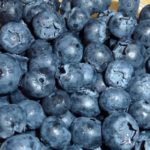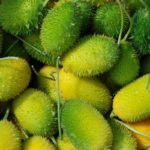 Welcome to the World Crops Database; a database of agriculture with hundreds of agricultural crops. The database includes scientific names, synonyms, and common names in several languages.
Welcome to the World Crops Database; a database of agriculture with hundreds of agricultural crops. The database includes scientific names, synonyms, and common names in several languages.

Each crop in the database is assigned to one or more different crop categories. Main categories are cereals, fruits and vegetables, but many other categories are used to give additional information about the crop (spices, herbs, fodder crops, fiber crops, etc.).
Using the Database
The World Crops Database can be explored in several ways:
The database has hundreds of crops with thousands of names. Click here to see some statistics about the database.
About the database
The World Crops Database is an agricultural database. The word “agriculture” originates from the Latin word agricultura, which is a combination of ager (the field) and cultura (cultivation). So actually, agriculture is “cultivation of the field”, or “tillage of the field”.

Agriculture started more than 10,000 years ago, probably in the fertile regions of Mesopotamia.

Early agriculture was limited to a few cereals and pulses for human consumption. The earliest crops included emmer, einkorn, wheat, barley, peas, lentils, bitter vetch, chick peas and flax. Gradually more and more plants were domesticated. Apart from cereals, vegetables and fruits, many other useful plants were discovered; some are grown to be used in the human diet (spices, herbs), others for fibers, to produce drinks (coffee, tea, beer, wine, etc.), or for many other uses. Modern agriculture also includes many crops grown for industrial purposes, for example to produce rubber or to extract oils or
chemicals that can be used in numerous products (medicines, glues, dyes, perfumes, etc.). And then there are of course plants that are grown as ornamentals, for cut flowers, or for other reasons.
All these hundreds of crop species are known by thousands of different names. Even in one language, a plant can have several common names. In English, the Plum (Scientific name: Prunus domestica) is sometimes called Prune, or Common plum or European plum. Tangerines (Citrus reticulata) are known as Mandarine, Clementine, Mandarin, or Mandarin orange.

The World Crops Database includes a collection of all these names of agricultural crops. Most records in the database refer to a single crop species. However, in some cases a record refers to a subspecies or variety, and in some cases to a group of species (a genus).
For “agricultural crop” the following definition is used:
“a non-animal species or variety that is grown or gathered to be harvested as food, fiber, livestock fodder, fuel or for any other economic purpose”
The term "crop" most commonly refers to plants, but it can also include species of fungi or species of algae.

Plant species in the World Crops Database are in all cases recorded with their scientific name (or binomial name) consisting of the genus name and the specific name. In some cases the name includes the subspecies or the name of a variety. For each record the database includes the botanical classification in Orders and Families. Each species has at least one common name in English, but for most species the
database has a list of common names in English, Spanish, Dutch, French, German and Italian (English, Español, Nederlands, Français, Deutsch, Italiano).
The World Crops Database is a work in progress, with new crops and crop names added regularly. The current focus is on food crops, especially cereals, vegetables, and fruits, but the scope is gradually expanding to include other types of crops, including wild-harvested plants that are occasionally cultivated but often collected from the wild. The database also includes some plants propagated by gardeners, such as ground covers that are not considered commercial crops.
A feature under development in the database is to group the agricultural plants in a number of crop categories.
You can help improving the World Crops Database

- Please report any errors
- Missing crops? Please send any names of crops that you didn't find in the database
- Missing names? Please send any additional names for the agricultural crops in the database.
- Wrong category? Please send a message to indicate the proper categories for individual crops.
- Missing pictures? You can send pictures to complete the database. Have a look at the list of crops without pictures.
- Please suggest other categories that could be included in the database.
- Please suggest crop names in other languages.
Did you know that?

- According to the website of Salvard Global Seed Vault, more than 7,000 plant species have historically been used in human diets. In modern agriculture less than 150 species are being used for food production.
- Major world crops include Sugarcane, Maize, Wheat, Rice, Potatoes, Sugar beet, Soybean, Oil palm, Barley, Tomato and Cotton.
Quotes and Proverbs about agriculture
There are many proverbs and quotes about agriculture; click here for more.
The greatest advances of civilization, whether in architecture or painting, in science and literature, in industry or agriculture, have never come from centralized government.
(Milton Friedman)
No one hates his job so heartily as a farmer.
(H.L. Mencken)
Organic farming has been shown to provide major benefits for wildlife and the wider environment. The best that can be said about genetically engineered crops is that they will now be monitored to see how much damage they cause.
(Prince Charles)
Definitions

The World Crops Database is:
- World = worldwide, global, universal, covering the whole world
- Crop = a plant that is grown in large quantities, especially as food
- Database = an organized set of data that is stored in a computer and can be looked at and used in various ways
